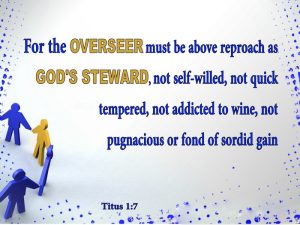 So, here we are again. I trust your week has gone well and you have sensed and enjoyed the presence of the Lord in your life over this last week. For the last couple of weeks, as part of our ongoing study of the Church, we have been looking at the biblical qualifications God has set forth for those whom He calls to lead His church. The passages that we have been looking at are in Paul’s first letter to Timothy and his letter to Titus. Both men were companions and coworkers of Paul on his missionary journeys and worked closely with him in the establishment of churches where people were coming to faith in Christ as a result of their ministry. The circumstance behind both letters is that Paul has left these men in charge of setting things in order in their respective churches. In 1 Tim 1:3ff we read, “ As I urged you upon my departure for Macedonia, remain on at Ephesus so that you may instruct certain men not to teach strange doctrines, 4 nor to pay attention to myths and endless genealogies, which give rise to mere speculation rather than furthering the administration of God which is by faith. 5 But the goal of our instruction is love from a pure heart and a good conscience and a sincere faith. 6 For some men, straying from these things, have turned aside to fruitless discussion, 7 wanting to be teachers of the Law, even though they do not understand either what they are saying or the matters about which they make confident assertions.” We see that there were men who had taken a leadership role in the Ephesian church that were teaching false doctrine and falling into foolish speculation about things of little or no consequence. These men were leading people astray and creating confusion among the saints in Ephesus. Just a few verses later, in vss 18ff, we see some of the specific harm being done. “This command I entrust to you, Timothy, my son, in accordance with the prophecies previously made concerning you, that by them you fight the good fight, 19 keeping faith and a good conscience, which some have rejected and suffered shipwreck in regard to their faith. 20 Among these are Hymenaeus and Alexander, whom I have handed over to Satan, so that they will be taught not to blaspheme.” So Timothy is tasked to “fight the good fight” against these men and the heresies they are introducing.
So, here we are again. I trust your week has gone well and you have sensed and enjoyed the presence of the Lord in your life over this last week. For the last couple of weeks, as part of our ongoing study of the Church, we have been looking at the biblical qualifications God has set forth for those whom He calls to lead His church. The passages that we have been looking at are in Paul’s first letter to Timothy and his letter to Titus. Both men were companions and coworkers of Paul on his missionary journeys and worked closely with him in the establishment of churches where people were coming to faith in Christ as a result of their ministry. The circumstance behind both letters is that Paul has left these men in charge of setting things in order in their respective churches. In 1 Tim 1:3ff we read, “ As I urged you upon my departure for Macedonia, remain on at Ephesus so that you may instruct certain men not to teach strange doctrines, 4 nor to pay attention to myths and endless genealogies, which give rise to mere speculation rather than furthering the administration of God which is by faith. 5 But the goal of our instruction is love from a pure heart and a good conscience and a sincere faith. 6 For some men, straying from these things, have turned aside to fruitless discussion, 7 wanting to be teachers of the Law, even though they do not understand either what they are saying or the matters about which they make confident assertions.” We see that there were men who had taken a leadership role in the Ephesian church that were teaching false doctrine and falling into foolish speculation about things of little or no consequence. These men were leading people astray and creating confusion among the saints in Ephesus. Just a few verses later, in vss 18ff, we see some of the specific harm being done. “This command I entrust to you, Timothy, my son, in accordance with the prophecies previously made concerning you, that by them you fight the good fight, 19 keeping faith and a good conscience, which some have rejected and suffered shipwreck in regard to their faith. 20 Among these are Hymenaeus and Alexander, whom I have handed over to Satan, so that they will be taught not to blaspheme.” So Timothy is tasked to “fight the good fight” against these men and the heresies they are introducing.
 The term” fight” used here is not merely to stand against or oppose; it is, rather, a term of warfare…of taking up arms against an enemy. It speaks of a life and death struggle…a struggle for survival. Paul recognized that the struggle to uphold God’s Word and purpose is a fight for the very survival of the effective church. So it was then…so it remains today. The instructions given to Timothy for the battle to uphold and sustain the saints are the same instruction we are to heed today. In his letter to Timothy, he reiterates the gospel message, reminding him of its simplicity and importance. He reminds him of the need for a strong faith and sound doctrine. He reminds him of the importance of prayer and gives instructions for proper behavior in the church service and family structure. Beloved, these are the same battlegrounds we face today…defending the gospel… defending the faith… defending the Word… defending the church…and defending the family. And part of this battle is to ensure that qualified and godly men are in place to lead in that defense.
The term” fight” used here is not merely to stand against or oppose; it is, rather, a term of warfare…of taking up arms against an enemy. It speaks of a life and death struggle…a struggle for survival. Paul recognized that the struggle to uphold God’s Word and purpose is a fight for the very survival of the effective church. So it was then…so it remains today. The instructions given to Timothy for the battle to uphold and sustain the saints are the same instruction we are to heed today. In his letter to Timothy, he reiterates the gospel message, reminding him of its simplicity and importance. He reminds him of the need for a strong faith and sound doctrine. He reminds him of the importance of prayer and gives instructions for proper behavior in the church service and family structure. Beloved, these are the same battlegrounds we face today…defending the gospel… defending the faith… defending the Word… defending the church…and defending the family. And part of this battle is to ensure that qualified and godly men are in place to lead in that defense.
We see the same exhortations and concerns in Paul’s letter to Titus. Paul writes, in Tit 1:5ff, “For this reason I left you in Crete, that you would set in order what remains and appoint elders in every city as I directed you … For there are many rebellious men, empty talkers and deceivers, especially those of the circumcision, 11 who must be silenced because they are upsetting whole families, teaching things they should not teach for the sake of sordid gain…For this reason reprove them severely so that they may be sound in the faith, 14 not paying attention to Jewish myths and commandments of men who turn away from the truth.” He goes on to give Titus instruction in ensuring order in the church and home. Here, too, he reminds Titus of the essence of the gospel and the example set by Jesus. These are the things that were always on the heart of Paul… because these are the things always on the heart of our Lord. And they are to be the concerns and passions of our hearts as well.
 Beloved, there are so many things which seek to capture our attention and inflame our desires…to capture our hearts and minds. We can be easily distracted from eternal realities and concerns by earthly ones. Some of these are clearly sinful and harmful… youthful lusts…love of money… seats of power and recognition…preoccupation with self. But some are good things, in their proper place, but that can distract us if held improperly… earning a living… raising a family… enjoying friendships… even the simple enjoyment of a good meal or a job well done. These are to be occasions of thanksgiving and praise to the One who has gifted us with them. But they can all too easily be a distraction from that One… our Father from whom all blessings flow. We keep these things in their proper place when we keep God in His proper place… at the center of our hearts… us obedient to His will… and immersed in His enduring and unending love.
Beloved, there are so many things which seek to capture our attention and inflame our desires…to capture our hearts and minds. We can be easily distracted from eternal realities and concerns by earthly ones. Some of these are clearly sinful and harmful… youthful lusts…love of money… seats of power and recognition…preoccupation with self. But some are good things, in their proper place, but that can distract us if held improperly… earning a living… raising a family… enjoying friendships… even the simple enjoyment of a good meal or a job well done. These are to be occasions of thanksgiving and praise to the One who has gifted us with them. But they can all too easily be a distraction from that One… our Father from whom all blessings flow. We keep these things in their proper place when we keep God in His proper place… at the center of our hearts… us obedient to His will… and immersed in His enduring and unending love.
So, in both letters, one thing we see, as part of setting things in order and defending the faith and the Church, is that instructions are given for the qualifications and establishment of elders…shepherds…to oversee the churches that God builds. And it is to these instructions that we return today. Let’s look again at the list of qualifications for elders that we find in 1 Tim 3:1ff. “It is a trustworthy statement: if any man aspires to the office of overseer, it is a fine work he desires to do. 2 An overseer, then, must be above reproach, the husband of one wife, temperate, prudent, respectable, hospitable, able to teach, 3 not addicted to wine or pugnacious, but gentle, peaceable, free from the love of money. 4 He must be one who manages his own household well, keeping his children under control with all dignity 5 (but if a man does not know how to manage his own household, how will he take care of the church of God?), 6 and not a new convert, so that he will not become conceited and fall into the condemnation incurred by the devil. 7 And he must have a good reputation with those outside the church, so that he will not fall into reproach and the snare of the devil.”
So, he is a man who is above reproach… a man who exhibits all the qualities that follow. Last week we ended by looking at the term, “pugnacious” or “quarrelsome” and saw that this attitude and behavior can have no place in the life of a shepherd of the church. A shepherd of God’s people is one who is not pugnacious or quick to lose his temper. He is not a brawler or one who strikes out at those who might oppose him or hold a different view of things. It stands in contrast to the two qualifications that follow…”gentle” and “peaceable”. The first is epieikēs and is variously translated “gentle”, “mild”, or “patient”. Rather than someone who is easily angered, this speaks of someone who is patient when wronged and gentle in approach. It is a behavior founded in love and care for those around them and a godly “carelessness” in regards to self. Aristotle said, “It has the idea of a person who easily pardons human failure.” Let me say that again…”a person who easily pardon’s human failure”. I can speak to this first hand, because it is a trait that does not come naturally to me. God has created me to be a teacher and an exhorter…I have a passion to see people grow and become more like Christ. I think Paul may have shared this passion, but it can come with a tendency to be ungentle or unforgiving of human frailty and failure. We see it played out in the contrast between Paul and  Barnabas in their response to the failings of Mark found in Acts 15:36ff. “After some days Paul said to Barnabas, “Let us return and visit the brethren in every city in which we proclaimed the word of the Lord, and see how they are.” 37 Barnabas wanted to take John, called Mark, along with them also. 38 But Paul kept insisting that they should not take him along who had deserted them in Pamphylia and had not gone with them to the work. 39 And there occurred such a sharp disagreement that they separated from one another, and Barnabas took Mark with him and sailed away to Cyprus. 40 But Paul chose Silas and left, being committed by the brethren to the grace of the Lord. 41 And he was traveling through Syria and Cilicia, strengthening the churches.”
Barnabas in their response to the failings of Mark found in Acts 15:36ff. “After some days Paul said to Barnabas, “Let us return and visit the brethren in every city in which we proclaimed the word of the Lord, and see how they are.” 37 Barnabas wanted to take John, called Mark, along with them also. 38 But Paul kept insisting that they should not take him along who had deserted them in Pamphylia and had not gone with them to the work. 39 And there occurred such a sharp disagreement that they separated from one another, and Barnabas took Mark with him and sailed away to Cyprus. 40 But Paul chose Silas and left, being committed by the brethren to the grace of the Lord. 41 And he was traveling through Syria and Cilicia, strengthening the churches.”
We don’t know the specifics of John Mark’s “desertion in Pamphylia” but it is recorded in a single sentence by Luke in Acts 13:13, “Now Paul and his companions put out to sea from Paphos and came to Perga in Pamphylia; but John left them and returned to Jerusalem.” John Mark, for whatever reason, left them and the work to which they had committed. Now note that Paul’s issue was not that Mark deserted him, but that he deserted the work… that which was Paul’s great passion and calling. That was the heart of the argument between Paul and Barnabas. Paul was unwilling to risk “the brethren” he desired to check on…his heart and passion was for their edification and strengthening. Barnabas, exhibiting the trait of gentleness…a quickness to forgive human frailty and failure…, had a heart and passion for the brother in front of him, John Mark. This is to be the heart of an elder…a quickness to forgive and to overlook and understand human frailty… a willingness to give a second chance… a commitment to walk alongside the weak… the stumbling… and uphold them.
Going back to our text, we see that the next qualification for overseers is that they are “peaceable”. This one requires little explanation, because it is simply the opposite of pugnacious. It is literally “not quarrelsome”. While “pugnacious might focus more on physical confrontation and strife, this term may have more to do with verbal altercation and strife. The former is a fighter; the latter is an arguer. And the thought is it is argument for arguments sake. It is the person who will take any side of an argument…they are not committed to a particular cause, they just like to argue. They are contentious for no reason. They like the drama of the debate…the need to win the day. Obviously, this is not the kind of man you want in leadership seeking to determine God’s direction and will for His church. Nothing could ever get done…no decisions could ever be made. There would just be continuous argument and strife, dishonoring the God we claim to serve and being a poor witness and example to the watching world.
The next qualification we find is that an elder is to be free from the love of money…literally a “love of silver”. We see similar language in Titus, where it says that an overseer must not be “fond of sordid gain”. The first speaks to an elder not having an affection for money. This same word is used in chapter 6, where Paul writes, “But those who want to get rich fall into temptation and a snare and many foolish and harmful desires which plunge men into ruin and destruction. 10 For the love of money is a root of all sorts of evil, and some by longing for it have wandered away from the faith and pierced themselves with many griefs.” This expresses the same truth that we find in Jesus words in Matt 6:24, “No one can serve two masters; for either he will hate the one and love the other, or he will be devoted to one and despise the other. You cannot serve God and wealth.”
 The second term shows another aspect of a love for money… a love of “sordid” gain. It includes a love of money, but it speaks of the secret thrill of money acquired by craftiness and deceit. It speaks of the heart of a man who would rather make one dollar through unjust or clever means than two dollars honestly. For this man, it is as satisfying to “put one over” on the one defrauded as it is to gain the wealth in the process. Even in our little community we hear stories of people entrusted with the oversight of institutional or corporate funds that embezzle those funds and flee, leaving those who trusted them in financial difficulty and despair.”Sordid gain” also contains the thought of ministry done as a means to accumulate wealth. It is not to say that one who ministers out of his gifting and calling should not be paid…scripture makes it clear that this is not the case. Rather, ministry should not be done for the purpose of gaining wealth. Here, too, we can find many examples of men and woman in our society whose “ministries” afford them a lavish lifestyle and an overindulgent life. We see this same kind of man in Tit 1:11…men who are “teaching things they should not teach for the sake of sordid gain.” Neither the love of money nor the fondness for sordid gain is to be found in the heart of the shepherd… the pastor… of the church. He will end up serving one master… the pursuit of wealth… and abandon his rightful master and Lord… and the church which He purchased with His own blood. God save us from those “shepherds”.
The second term shows another aspect of a love for money… a love of “sordid” gain. It includes a love of money, but it speaks of the secret thrill of money acquired by craftiness and deceit. It speaks of the heart of a man who would rather make one dollar through unjust or clever means than two dollars honestly. For this man, it is as satisfying to “put one over” on the one defrauded as it is to gain the wealth in the process. Even in our little community we hear stories of people entrusted with the oversight of institutional or corporate funds that embezzle those funds and flee, leaving those who trusted them in financial difficulty and despair.”Sordid gain” also contains the thought of ministry done as a means to accumulate wealth. It is not to say that one who ministers out of his gifting and calling should not be paid…scripture makes it clear that this is not the case. Rather, ministry should not be done for the purpose of gaining wealth. Here, too, we can find many examples of men and woman in our society whose “ministries” afford them a lavish lifestyle and an overindulgent life. We see this same kind of man in Tit 1:11…men who are “teaching things they should not teach for the sake of sordid gain.” Neither the love of money nor the fondness for sordid gain is to be found in the heart of the shepherd… the pastor… of the church. He will end up serving one master… the pursuit of wealth… and abandon his rightful master and Lord… and the church which He purchased with His own blood. God save us from those “shepherds”.
Before we close our study this evening, I would like to look at some qualifications that are in Titus but are not found specifically in 1 Tim. They are certainly included in concept, as they are fundamentally included in the other terms used. In Titus 1:8 we find the qualifications that an elder is to be “loving what is good”, “just”, “devout”, and “self-controlled”. These terms do not require a lot of explanation as they are words familiar to us and in keeping with those we have already explored. “Loving what is good” simply means loving what is good. The affections of the elders are for the right things…those things that are good in God’s eyes and plans. “Just” is actually better translated “righteous”. It describes a man whose life and conduct are approved by God… a man who lives in accordance with divine standards and principles. The next qualification… “devout” means much the same thing. In fact, “righteous” and “devout are often found together in scripture as they are such close companions in meaning. It speaks of being practically holy; free from egregious sin. When sin is committed, it is quickly confessed and turned away from. It is the life of a man who has yielded to the transforming work of Christ… one who has, to a great extent, become like Jesus.
 The final term we will look at this evening is “self controlled”. It is literally “in strength” or” through strength”. It speaks of having power over a thing… mastering, controlling, curbing, restraining. And the thing being mastered…being restrained… is self. Again, it is easy to understand why this must be a qualification to lead the church. Someone with little self control cannot be trusted. He cannot be trusted to be diligent in his study of the Word or his teaching. He cannot be trusted to exercise love for his people. He cannot be trusted to restrain himself from sin or evil desires. He cannot be trusted to discern God’s will or yield to His Spirit
The final term we will look at this evening is “self controlled”. It is literally “in strength” or” through strength”. It speaks of having power over a thing… mastering, controlling, curbing, restraining. And the thing being mastered…being restrained… is self. Again, it is easy to understand why this must be a qualification to lead the church. Someone with little self control cannot be trusted. He cannot be trusted to be diligent in his study of the Word or his teaching. He cannot be trusted to exercise love for his people. He cannot be trusted to restrain himself from sin or evil desires. He cannot be trusted to discern God’s will or yield to His Spirit
Beloved, once again we are reminded of the high calling and responsibilities of those called to lead. We see how important it is to pray for those in leadership over us… to be committed to their well being and spiritual soundness. But let us remember, too, that their calling is not so different then our own. God is honored and we are benefitted by striving after these same things. They serve not only as a standard for leadership… they are a standard of Christ-likeness that we can, and should, seek after.
Let us pray.


0 Comments